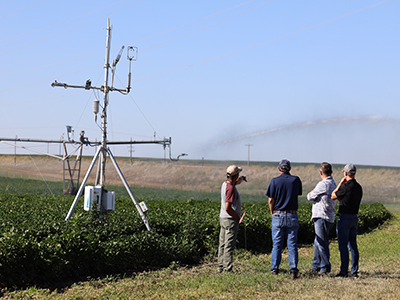Coverage of DWFI research and events reaches more than 219 million people

Credit: Irrigation Today
Coverage of DWFI research, announcements and events in various external media outlets over the past year earned the institute a reach of more than 219 million views through 255 media mentions.
An NPR news story on drought, in which Jesse Bell, DWFI director of water, climate and health, was quoted was the top article, reaching more than 50 million people.
In addition to coverage of the 2023 Water for Food Global Conference, of which external new stories resulted in nearly 3 million views, highlights of DWFI’s media exposure include:
Bell speaks with media regarding child's death caused by brain-eating amoeba
August 19, 2022 | KETV Omaha
After the recent tragic death of an 8-year old Nebraskan, DWFI Director of Water, Climate and Health Jesse Bell, Ph.D. explains how cases of brain-eating amoebas, though still extremely rare, are now appearing in more northern states due to warming temperatures.
Bringing world lessons home: Learning how ag irrigation is approached elsewhere is key to improving strategies here
October 6, 2022 | Irrigation Today
Irrigation Today featured an article by Christopher Neale, DWFI Director of Research, in the Fall 2022 edition of its magazine. The story explores how learning how ag irrigation is approached elsewhere around the world is key to improving strategies here in the U.S. Neale specifically discusses the state of irrigation in Brazil, sub-Saharan Africa and the U.S. — areas of the world in which DWFI has extensive knowledge on irrigation systems.
"Instead of growing the largest crop possible, improve profits by optimizing resources," said Neale.
A hotter, drier future could change how we eat, how we breathe and where we get our water
November 29, 2022 | NPR
Dry ground doesn’t just hurt agriculture. It can also hurt people, by making its way into their lungs through dust storms like the ones that hit western Kansas earlier this fall.
Jesse Bell, DWFI director of water, climate and health, studies water, climate and health at the University of Nebraska Medical Center and was interviewed in a recent story by Nebraska Public Media. He said when drought hits, public health declines — even if that’s not immediately clear.
“When you look at other weather-related disasters, you can see the impacts on society pretty quickly,” he said. “Drought itself in the United States typically isn’t a cause of death. But drought changes the environment, and that change in the environment can lead to human health outcomes.”
Air pollution from dust-storms and wildfires could cause serious problems for people with asthma. Or hot, dry conditions could increase heat-related deaths and suicides from farmers struggling with growing conditions.
What the future looks like with the new normal of hotter, drier and longer droughts
December 11, 2022 | NPR
DWFI Director of Water, Climate and Health Jesse Bell was interviewed by Harvest Public Media for a story on drought and its future impact on human health.
"Drought changes the environment, and that change in the environment can lead to human health outcomes," said Bell.
Water challenges met with innovations
January 17, 2023 | Nebraska Farmer
DWFI Executive Director Peter McCornick was interviewed for a recent article by Nebraska Farmer, in which he touched on the unique resources, challenges and innovation in managing water for Nebraska agriculture.
Even in a state with abundant resources, water can easily be overexploited, McCornick says. Nebraska is not immune to a growing demand for water to grow agricultural products and to more severe weather conditions that can challenge producers and water managers.
However, “because of the water and leadership to have the forethought to manage water well, Nebraska is in a relatively good position for climate change,” McCornick says.
Efficiencies in crop production improve livestock productivity
March 2023 | Nebraska Cattlemen
Livestock production has increased considerably in the United States over the last 60 years, leading to a corresponding increase in demand for animal feed — of which the state of Nebraska plays a major part in fulfilling.
Crop yields and livestock production are closely intertwined in Nebraska. According to the Nebraska Corn Board, about 16% of Nebraska corn is fed to livestock within the state. Another 24% is used to feed livestock throughout the U.S. and around the world. When our crop systems are efficient and productive, our livestock production is as well — and this includes the effective use of water.
Given the importance of livestock production to Nebraska’s economy and its impacts on water resources, there are surprisingly few studies related to its water productivity. However, in 2019, the Daugherty Water for Food Global Institute (DWFI) at the University of Nebraska produced the Nebraska Water Productivity Report (NWPR), which assesses the water productivity of crop and livestock production.
DWFI and its partners throughout the U.S. and the world will continue to explore new technology and enhance existing tools and partner with farm producers and water managers to address complex challenges to water use in agriculture. With a large portion of Nebraska crops being grown to feed cattle, any additional efficiencies gained in use of water resources directly improve the water productivity of cattle. Innovations can also help producers adapt to climate change and unpredictable weather; crop water use; and nutrient variability — all factors that can ultimately affect yields and profitability.
$52 mn in 5 years: Why is irrigation agritech struggling to attract VC investments?
March 31, 2023 | Business Today
Ankit Chandra, DWFI research program manager, was interviewed about his recent report on venture capital investments to the irrigation agritech market for a story by India's largest business magazine, Business Today.

Credit: DWFI
Venture capital investments to the irrigation agritech market have remained extremely low, with just $52 million invested over the last five years, according to Chandra's report. Investors are not putting money into the sector for a variety of reasons, including its slow growth and non-compelling returns on investment, the study finds. Irrigation agritech start-ups focus on water management to address water crisis in irrigated agriculture, enhance climate resilience, decrease water and energy consumption, and leverage water data for managing water risks and minimizing environmental impact. The study has identified and mapped 21 active agritech start-ups in the agricultural water use ecosystem, of which 15 are backed by private investment or venture capital investors. The biggest challenge for irrigation agritech start-ups is to reduce customer acquisition costs while scaling up, which is often exacerbated by time pressure from investors, particularly those without long-term experience in agricultural innovation. Employing a direct-to-customer marketing approach, the need for in-field education and after-sales support for small farmers makes it difficult for companies to grow their customer network. To overcome these challenges, some start-ups are now looking towards building partner relationships to operate through existing distribution channels, the study finds. Despite low investment, there is potential for growth as more start-ups focus on sustainability and climate change. Additionally, large enterprises are investing in this sector, indicating a potential shift in the industry.
FY 2023 Annual Report
- Overview
- Introduction
-
Research and Policy
-
Global
- Brazilian agricultural state looks to Nebraska and DWFI to sustainably manage water resources
- Irrigation equipment ownership not always best for smallholder farmers
- McCornick and Neale re-elected to World Water Council, DWFI involved in preparations for the World Water Forum
- Understanding the agtech ecosystem in India can spur future investments
-
Regional + National
- DAWN Project testing its decision-support tools with corn and soybean growers
- Water Center director helps City of Lincoln find second water source
- Water, Climate and Health program makes an impact in Nebraska
- DWFI's flux tower network now helps validate carbon credits
- Understanding climate’s effect on the health of Americans
- Groundwater transfer success stories guide water managers in meeting local water needs
- Advancements in crop modeling help adapt to climate change
-
Global
-
Education
- Faculty Fellows
-
Supported Students
- DWFI funds eight new students working on mission-related projects
- DWFI continues support of Platte Basin Timelapse interns
- Estimation of manure nutrient capacity in Nebraska minimizes water quality impacts
- Could cover crops replace offset in-season corn fertilizer?
- Congratulations to DWFI-supported student graduates
-
Communication
- Digital and online engagement connects DWFI with its global audience
- Coverage of DWFI research and events reaches more than 219 million people
- Creative storytelling used to amplify DWFI smallholder irrigation research outputs
- DWFI expertise tapped for national reports and publications
- DWFI staff receive well-deserved recognition
- 2022 Nebraska Water Center Annual Report now available
-
Outreach and Events
- Global Conference draws international audience to address water and food security
- On-farm event in Western Nebraska strengthens partnerships, spurs new ideas
- Engagement recovers to pre-pandemic levels
- Drought at forefront of discussions at Platte River Basin Conference
- 49th Annual Water Tour broadens knowledge about Nebraska water
- Nebraska Water Center seminars focus on hot topics in Nebraska Water
- Development
- Resources
- Search
FY 2023 Annual Report
- Overview
- Introduction
-
Research and Policy
-
Global
- Brazilian agricultural state looks to Nebraska and DWFI to sustainably manage water resources
- Irrigation equipment ownership not always best for smallholder farmers
- McCornick and Neale re-elected to World Water Council, DWFI involved in preparations for the World Water Forum
- Understanding the agtech ecosystem in India can spur future investments
-
Regional + National
- DAWN Project testing its decision-support tools with corn and soybean growers
- Water Center director helps City of Lincoln find second water source
- Water, Climate and Health program makes an impact in Nebraska
- DWFI's flux tower network now helps validate carbon credits
- Understanding climate’s effect on the health of Americans
- Groundwater transfer success stories guide water managers in meeting local water needs
- Advancements in crop modeling help adapt to climate change
-
Global
-
Education
- Faculty Fellows
-
Supported Students
- DWFI funds eight new students working on mission-related projects
- DWFI continues support of Platte Basin Timelapse interns
- Estimation of manure nutrient capacity in Nebraska minimizes water quality impacts
- Could cover crops replace offset in-season corn fertilizer?
- Congratulations to DWFI-supported student graduates
-
Communication
- Digital and online engagement connects DWFI with its global audience
- Coverage of DWFI research and events reaches more than 219 million people
- Creative storytelling used to amplify DWFI smallholder irrigation research outputs
- DWFI expertise tapped for national reports and publications
- DWFI staff receive well-deserved recognition
- 2022 Nebraska Water Center Annual Report now available
-
Outreach and Events
- Global Conference draws international audience to address water and food security
- On-farm event in Western Nebraska strengthens partnerships, spurs new ideas
- Engagement recovers to pre-pandemic levels
- Drought at forefront of discussions at Platte River Basin Conference
- 49th Annual Water Tour broadens knowledge about Nebraska water
- Nebraska Water Center seminars focus on hot topics in Nebraska Water
- Development
- Resources
- Search
Top image caption
Credit: Storyblocks | Flexx
Related Articles
DWFI expertise tapped for national reports and publications
DWFI’s research and expertise is frequently requested for respected industry publications and reports. Here is a sample of the publications.
Digital and online engagement connects DWFI with its global audience
The Water for Food Podcast continues to be a successful initiative with each new episode averaging over 1,000 downloads.
2022 Nebraska Water Center Annual Report now available
The Nebraska Water Center’s 2022 annual report is now available. This report highlights the research, outreach, and training done to support the Water Center’s mission in 2022.
COOKIE USAGE:
The University of Nebraska System uses cookies to give you the best online experience. By clicking "I Agree" and/or continuing to use this website without adjusting your browser settings, you accept the use of cookies.

